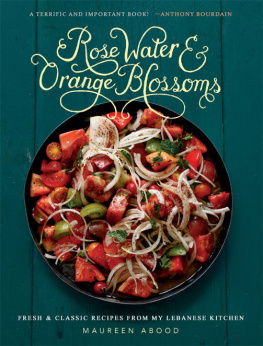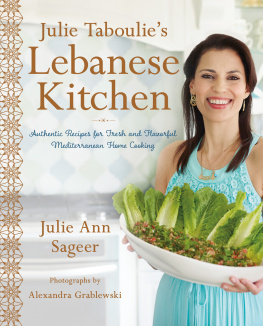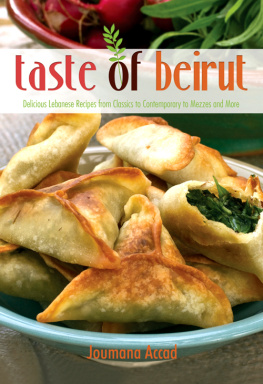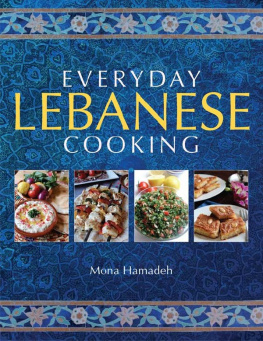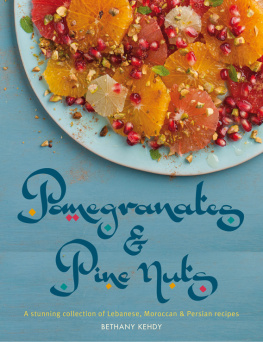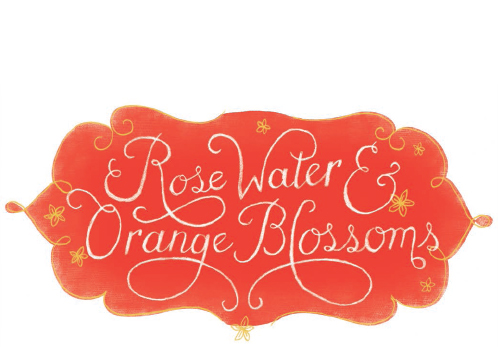
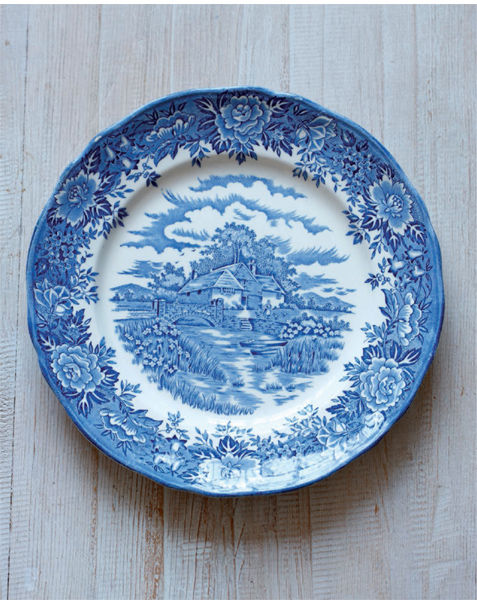
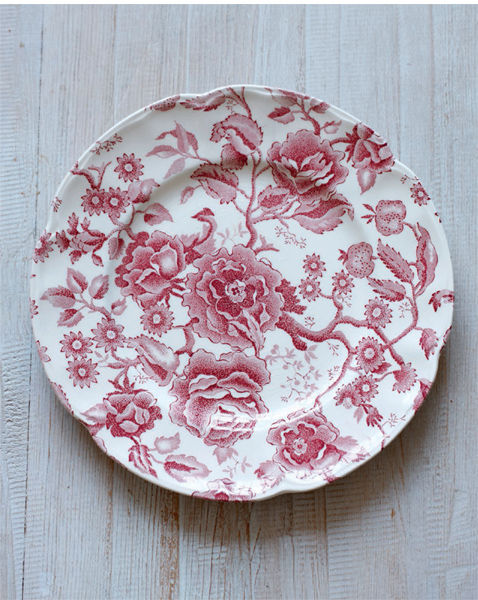
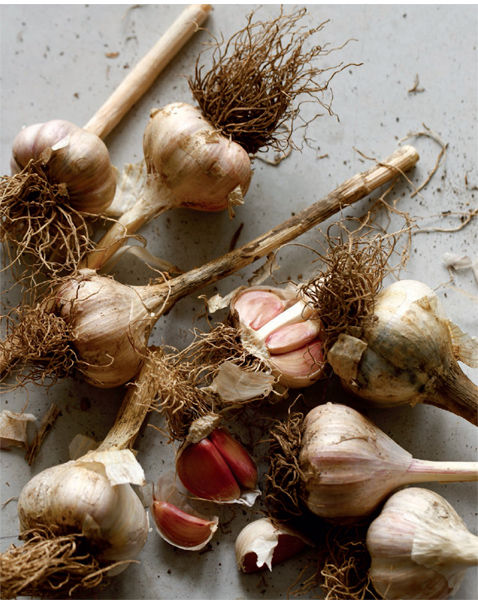
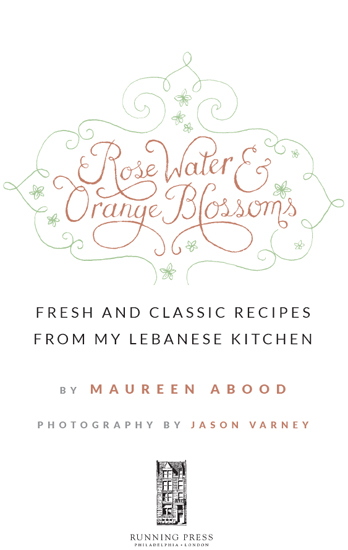
Copyright 2015 by Maureen Abood
Photography 2015 by Jason Varney
Rose Water & Orange Blossoms is a registered trademark of Maureen Abood
On Eating and Drinking from The Prophet by Kahlil Gibrain, copyright by Kahlil Gibrain and renewed 1951 by Administrators C.T.A. of Kahlil Gibrain Estate and Mary G. Gibrain. Used by permission of Alfred A. Knopf, an imprint of the Knopf Doubleday Publishing Group, a division of Random House LLC. All rights reserved.
Published by Running Press, A Member of the Perseus Books Group
All rights reserved under the Pan-American and International Copyright Conventions
Printed in China
This book may not be reproduced in whole or in part, in any form or by any means, electronic or mechanical, including photocopying, recording, or by any information storage and retrieval system now known or hereafter invented, without written permission from the publisher.
Books published by Running Press are available at special discounts for bulk purchases in the United States by corporations, institutions, and other organizations. For more information, please contact the Special Markets Department at the Perseus Books Group, 2300 Chestnut Street, Suite 200, Philadelphia, PA 19103, or call (800) 810-4145, ext. 5000, or e-mail .
Library of Congress Control Number: 2014952836
E-book ISBN 978-0-7624-5604-8
9 8 7 6 5 4 3 2 1
Digit on the right indicates the number of this printing
Designed by Joshua McDonnell
Edited by Kristen Green Wiewora
Hand-lettering and Illustrations by Katie Hatz
Food Styling by Chris Lanier
Prop Styling by Paige Hicks
Typography: Avenir, Constantia, and Gonte
Page 14 photo courtesy of Maureen Abood. Page 19 photo Stephanie N. Baker.
Running Press Book Publishers
2300 Chestnut Street
Philadelphia, PA 19103-4371
Visit us on the web!
www.offthemenublog.com
For my parents, Maryalice and Camille Abood, and in memory of all of my grandparents. Youve taught me the most important ingredient in the Lebanese kitchen: love.
And for my husband, Dan Shaheen. Im so blessed to share a Lebanese kitchen and home with you.

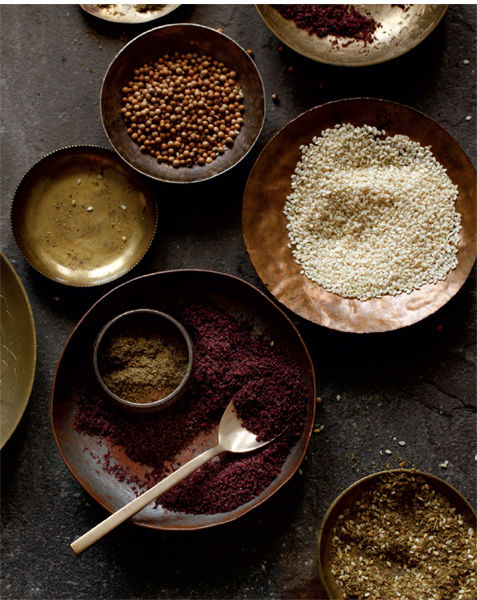
Contents
And when you crush an apple with your teeth, say to it in your heart,
Your seeds shall live in my body,
And the buds of your tomorrow shall blossom in my heart,
And your fragrance shall be my breath,
And together we shall rejoice through all the seasons.
Khalil Gibran
Have you ever been to Lebanon?
Its a question Ive been asked all my life, by kind and interested people, especially when I mention my Lebanese family, my passion for Lebanese cooking, and my desire to write about it too.
My answer, until recently, was simple: Nope. I hadnt visited Lebanon, and it pained me. It pained me not only because I hoped that this lack didnt somehow make my Lebaneseness less... authentic?... but also, and above all, because I pined, almost bitterly now, for this place that had loomed so large in my imagination all of my life.
I have tried to piece together the stories of my grandparents, all but one of them gone well before I was ten years old. I have tracked down every aunt and uncle who would bear with me to interview them, plied with luncheon and cake, about any detail they could remember of the younger lives of my grandparents: their childhoods in mountainous and verdant Lebanese villages, their marriages (arranged: I was, and remain, fascinated), the arduous journeys they made a century ago to start new lives in the United States, and their infrequent return visits back home, where the ravages of war would hold them, and all of us, at arms length.
Their stories have been so well constructed in my mind that there are times when I have wondered whats fact and whats fiction. I wondered too, then, when at last I visited Lebanon for the first time a few years ago, if Id built it up so much that the trip couldnt possibly live up to all that Id hoped for. Packing to leave, I considered calling it off just to avoid a possible letdown.
Good thing that was a fleeting thought. Lebanon welcomed me with a generosity akin to the most lavish table one could set. There were cousins and aunts and uncles Id never met, but whose faces and embraces were familiar with family feel. There was meaning around every corner, in the architecture and the terrain, the sea and the sky. And in the cedar trees, which lined the courtyard of the moody monastery of Lebanese Saint Charbel. Now the cedars of Lebanon became living, animated beauties for me, and not just an impression carved in the gold charms so many of us wear.
The food I experienced in Lebanon was both exactly what I had imagined, and beyond what I could have imagined. In the home of my cousin May in Beirut, there was a dazzling spreadone that she crafted on a days notice: kibbeh nayeh (yes, I ate it raw more than once in Lebanon; it was spicy and delicious), kofta with toum garlic sauce, silky smooth hummus, thick labneh, and a massive platter of grape leaves rolled from leaves she had foraged in our familys village, Dier Mimas in the south. She made 300 pinkiesized stuffed grape leaves (the smaller they are, the more difficult to roll). Also, platters tall with green plums and kumquats. There were copious Lebanese wines and arak, our strong anise liqueur. Then desserts of all sorts filled the table, but even my sweet tooth couldnt help being dazzled just as much by the fresh fava beans, handed to each one at the table straight from a brown bag from the farmers market. We plucked them from their pods, popped the beans from their thick green skins, salted them, and ate. It was the finest palate cleanser Ive ever tasted.
My trip to Lebanon was so rich with inspiration that Im still, in a sense, unpacking. Perhaps those sorts of experiences, like the finest meals, are meant to be savored and digested slowly, thoughtfully, and gratefully.

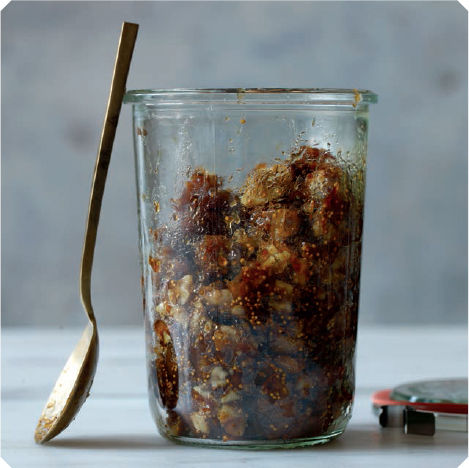
, page 216
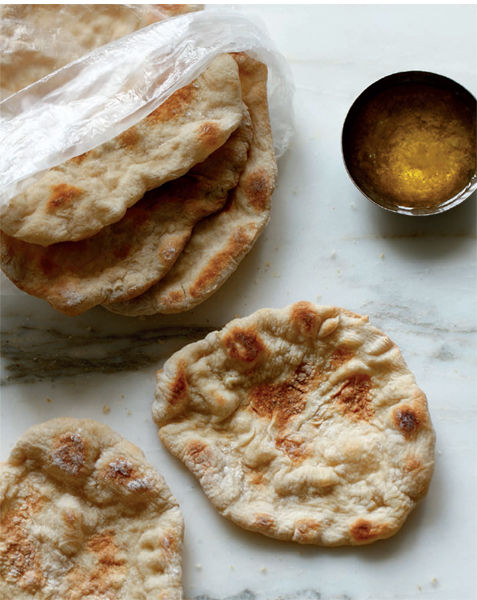
The path to this book has been not unlike the path that led me to Lebanon. Its been on my mind for such a long time that I hardly recall a time when I wasnt thinking of writing about Lebanese recipes, and the stories that are their finest ingredients.
Next page
